Szürke was the sweetest kitty cat my wife and I have ever known.
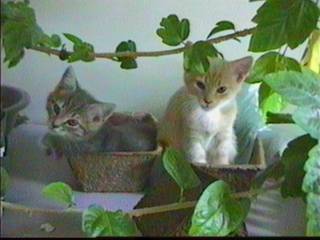 Szürke and his brother Kifli shortly after we adopted them.
Szürke and his brother Kifli shortly after we adopted them.
He was born in a litter of five in mid-April, 2001, at a family friend's house. We adopted him, along with his brother Kifli, in June that year. Szürke was a gray tabby (hence the name, which means gray in Hungarian), and we thought that he may fill the void that the loss of our first ever cat, Marzipan, left behind when he passed away about half a year earlier. But Szürke was a very different kitty. The gentleman that we got them from described him as a "lapcat" and he was spot on: Szürke was as friendly as cats can ever get, with us, with strangers, with me even after I spent some 10 months torturing him with pills, needles, and other forms of medication.
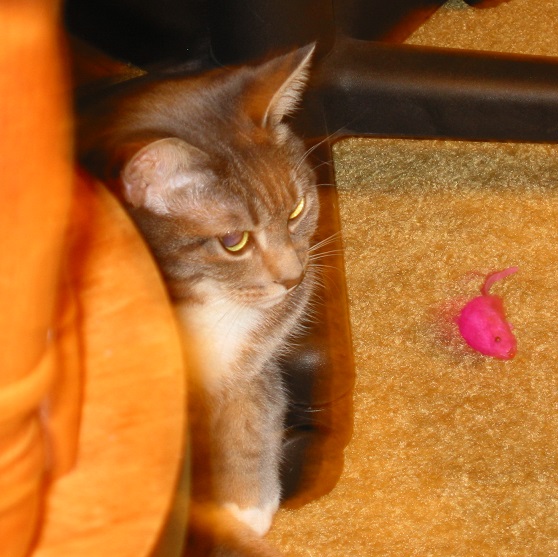
Szürke had the most beautiful eyes.
But I am jumping ahead of myself.
Szürke became gravely ill in early October, 2013, when a combination of the initial stages of serious kidney disease and a likely gastrointestinal infection made him severely anemic. We thought he wouldn't make it, but he lived through the worst, and spent ten months with us. Ultimately, we won every battle but the last one. This is the story of how that last day unfolded, after we were notified by the emergency veterinarian at Alta Vista Animal Hospital that Szürke is gravely unwell, and we have a decision to make.
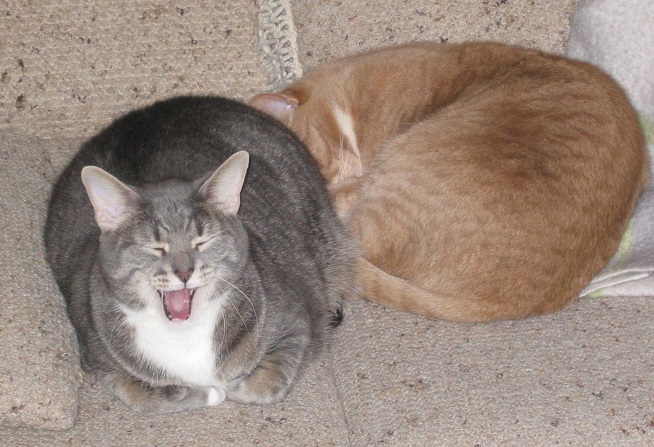
Szürke and Kifli, in happier times.
When we arrived at the ICU, the cat was in an oxygen tent, covered by a small towel. His eyes were open and he seemed a little agitated.
When I petted him and left my hand gently on him, he quieted down. His legs twitched occasionally.
He was still "himself"; he recognized our voices, he tried to find comfortable positions, he was still able to move around a little, albeit with grave difficulty.
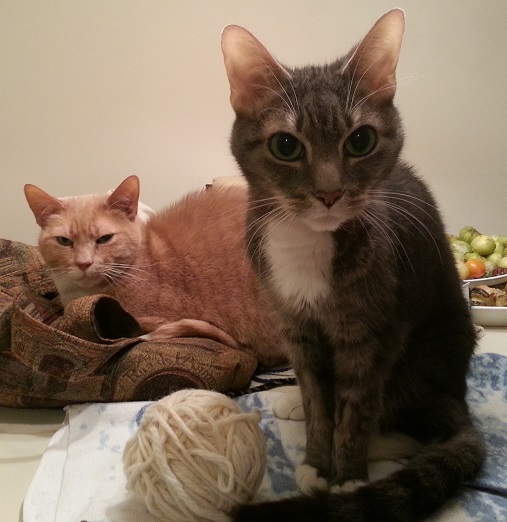
Szürke, recovering from anemia in the winter.
Once he tried to stand up, and I helped. On the second time, it became clear that he wanted to lie on his other side. He was more comfortable that way.
I asked if he was sedated or under any pain medication. He wasn't. His extreme lethargic condition was entirely due to his illness, not medication.
For a short while, we took him out of the oxygen tent and held him on our laps. Not for very long, as we didn't want to deprive him of the benefits of extra oxygen.
His eyes were mostly unresponsive. It was unclear if he was blind or just nearly blind. He wasn't blinking. The technician occasionally applied eyedrops to help him.
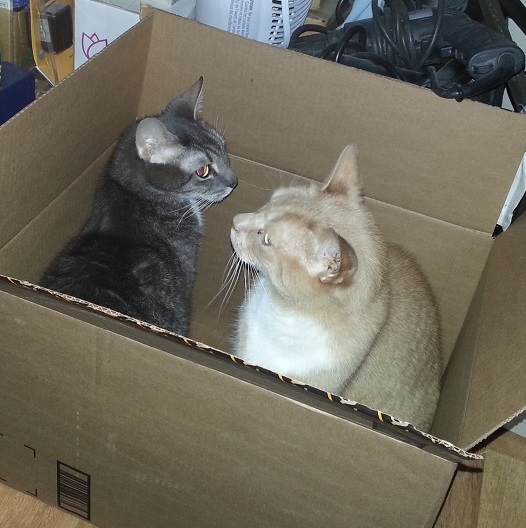
Szürke and Kifli sharing a box, two months ago.
We were with him for a couple of hours, as the hospital's "comfort room" was not ready. We also discussed with the doctor what his condition was:
- His kidney values were quite elevated;
- His heart was enlarged (perhaps in part due to his long-standing hyperthyroidism);
- His lungs showed evidence of fluid build-up in the X-ray;
- His severe oral problem remained unresolved.
Treating his heart and lungs would have meant using a diuretic, to rid his body of excess fluids. On the other hand, treating his kidneys would have required as much fluid as possible. A biological Catch-22. Nonetheless, it was possible, in principle, to keep him alive a little longer. I asked the doctor if there was any reasonable chance that his condition might improve and he would enjoy a reasonable quality of life for some time afterwards. The answer was negative.
After we received this answer, we agreed that his life be terminated. I signed the appropriate forms. We asked to have his cremated remains back.
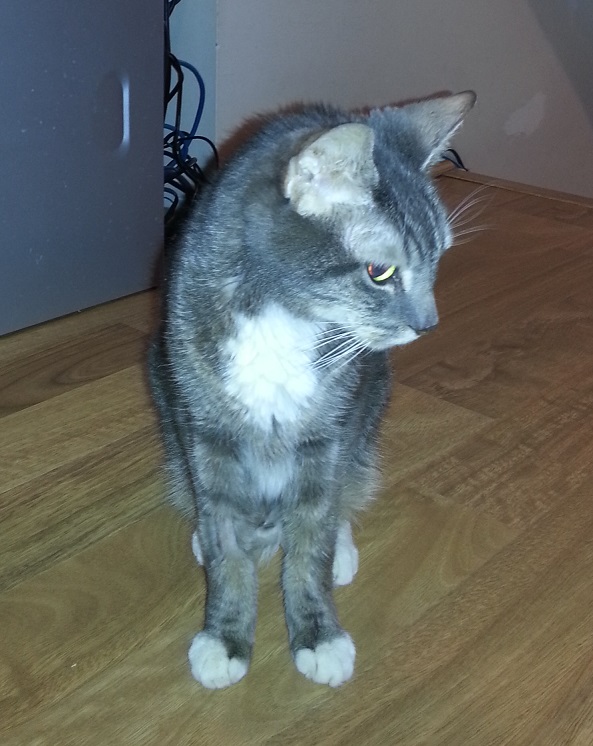
The very last picture of Szürke, on August 6, 2014.
Some time later, we were led to the "comfort room". I expressed my desire to hold Szürke on my shoulder one last time. The doctor interpreted this as though I asked to hold the cat while he received the fatal injection. I did not mind.
I was holding Szürke exactly the way I liked to hold him. (A veterinary assistant at Beechwood called him "velcro kitty" when he hung on to her shoulder like this, unwilling to let go.)
After a few seconds, Szürke became a little agitated. I don't think he was frightened, but he was uncomfortable, probably with pain. At this time, he received the sedative and he relaxed, with his eyes still open. As he was relaxing, I said, "Szerbusz Süsüke. Jó éjszakát." My wife also said, "Szerbusz Süsüke."
Quite by accident, I held him on my left shoulder just so that I clearly felt his heartbeat with my left hand around his little body. His heart was beating rapidly and forcefully; not a sign of health, more a sign that his heart was under considerable strain. His heart rate was probably around 250, high for a cat but not alarmingly high.
Then he received the second injection, a large dose of pentobarbital. I saw the liquid as it passed through the tiny IV tube. Moments later... tic-tic-tic-tic-tic-tic-tic-tic-tic... ti-tic... tic. It took no more than 2-3 seconds.
His heart was no longer beating. Fighting my tears, I said so to the doctor. She told us to take our time. However, I handed over the cat, still warm, still seemingly alive, to the doctor. The doctor took the cat, treating him also as though it was still a living animal, holding him gently on her shoulder and saying some soothing words. She then left the room.
I checked my phone. The time was 23:56, on August 8, 2014, International Cat Day.
We called Szürke many names. His name means gray in Hungarian, as he was a gray tabby. But we also called him "Szüszü", a diminutive form. My Mom started calling him "Süsü", silly in Hungarian, as he was a silly little lapcat. We also had many other names for him: Sünci, Sündörgönc, Süsüke, Sündöri-göndöri, Sücke. And sometimes, we called him "nosy kitty", as he was nosy indeed, curious until almost the very end. (Two days before he died, he still ran out to the balcony when my wife opened the balcony door in the evening.)
That summer when my Mom was here and gave Szürke his "Süsü" nickname, I once accidentally startled him. He then leaped from my room, down a height six stairs to the living room, but leaping over some stairs leading further down, in a rather unexpected show of aerial acrobatics. I still laugh when I think about it.
Near the end, I was giving him pills twice, sometimes four times a day. The first pill was Sucralfate (he preferred pills over the liquid form), which was best used on an empty stomach, and which blocked the absorption of other medications, hence a pause of 30-60 minutes. Then came the rest: Tapazole for his hyperthyroidism, Prednisone in a low dose, potassium glucamate, Omeprazole in the evenings, occasionally Cerenia when he vomited or seemed nauseous, sometimes Mirtazapine to boost his appetite. More recently, he also got Metronidazole, which was supposed to help his mouth heal; it didn't.
I still have the muscle memory of opening his mouth ("nagyra tátja!"), placing the pill on the back of his tongue and letting him swallow ("hamm, bekapja!") He was such a good boy... pilling wasn't always trouble-free, but more often than not, even when I botched it, he still managed to swallow his pills, including some rather large size capsules.
Sometime in the spring, he started to develop rather severe halitosis. As his fur also smelled funny, I suspected that this was a side effect of his kidney condition. I was probably wrong... eventually, we found out that the smell was likely associated with his oral ulcers. These got so bad a month ago, that he was no longer able to eat dry food.
In the past month, his treatment included an oral antibacterial rinse, and as a result, his halitosis pretty much vanished. I occasionally smelled a whiff, but that's all. And now I am missing even that terrible smell... I'd happily be immersed in it if it meant being able to hold Szürke on my shoulder one more time.
I was also applying transdermal codeine to his ears in the last few weeks, to help with the oral pain. I sang, to the tune of The Big Bang Theory's "soft kitty" song: "Jobb füle, bal füle, Sündörgönci-gönc..."
I also sang to him sometimes, "Süncike, büncike, Sündörgönci-dönc / Sündöröngi-bündöröngi Sündörgönc" to the same tune.
Szürke loved yogurt. For the past few years, my wife got into the habit of having a bowl of Activia blueberry yogurt for breakfast. Szürke always licked her bowl clean, until near the very end, when, as a result of either his waning appetite or his oral issues, he lost interest.
God, I miss him so much. I almost started crying as I was writing down these words.
Today, August 10, Szürke's brother, Kifli, spent a considerable amount of time sniffing the ground near our fireplace, where Szürke was resting on his final night (he was seeking cold places for some inexplicable reason, in fact he had a low body temperature when we got the the hospital on his final day) and where he had a litter box for easy access. Dare I believe that he was searching for his brother? How can I explain to Kifli what happened and why?

Szürke's medication spreadsheet. Sadly, not needed anymore.
And a postscript of sorts: On August 23, 2014, I visited Alta Vista animal hospital to pick up Szürke's remains. I also returned used syringes and some unused medication.
This included the refrigerated syringe containing the last dose of Aranesp, the darbepoetin injection that Szürke has been receiving, which boosted his red blood cell production.
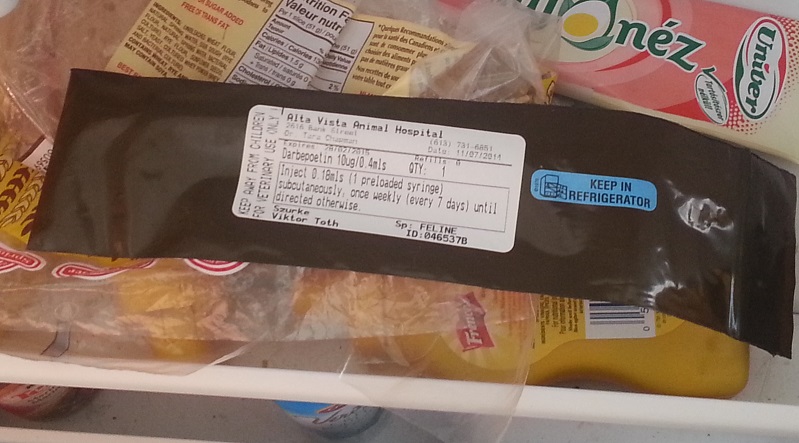
We were always very careful when transporting this medication, carrying it in thermally insulated bags containing bottles of cold water, to keep it from spoiling. Taking the medication out of the fridge with no concern about its temperature was kind of a symbolic last act. I felt heartbroken.


